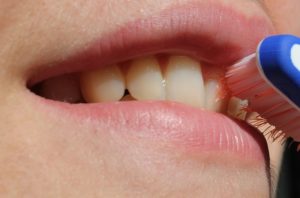 Periodontal disease, often called gum disease, is an infection in the gums and tissues that support your teeth. Over time, a build-up of bacteria and food particles takes hold in the crevice just below the gum line. As the bacteria grow and thrive, they feed on the tissue attached to your tooth and cause the supportive tissue to break down, creating a loose pocket. If this condition is not treated, the teeth will become loose and eventually fall out. Sadly, patients don’t realize they have the disease because it causes no pain. Gum disease, not aging, is the number one reason that American adults lose teeth.
Periodontal disease, often called gum disease, is an infection in the gums and tissues that support your teeth. Over time, a build-up of bacteria and food particles takes hold in the crevice just below the gum line. As the bacteria grow and thrive, they feed on the tissue attached to your tooth and cause the supportive tissue to break down, creating a loose pocket. If this condition is not treated, the teeth will become loose and eventually fall out. Sadly, patients don’t realize they have the disease because it causes no pain. Gum disease, not aging, is the number one reason that American adults lose teeth.
How can Periodontal Disease affect my overall health?
Researchers have found that people with periodontal disease are almost twice as likely to suffer from coronary artery disease as those without it. One theory asserts that bacteria from your mouth enter the blood stream and attach to fatty plaques in the coronary arteries (the blood vessels in your heart), causing clot formation and preventing your heart from receiving the nutrients and oxygen necessary to function properly (sometimes causing heart attack). Another theory suggests that chronic inflammation caused by periodontal disease increases plaque buildup in the coronary arteries.
The disease has also been linked to rheumatoid arthritis, low infant birth weight, diabetes, dementia, erectile dysfunction and stroke.
What can I do to prevent periodontal disease?
The American Dental Association found that bacteria in the mouth can start causing gum disease in only 24 hours. The first, and most important, step is to take excellent care of your teeth. You must brush twice a day, floss daily, and see us regularly for professional cleanings and exams.
Next, eating a nutritious, well-balanced diet is good for your gums and the rest of your body. Choose from a wide variety of foods, including breads, cereals, fruits, vegetables, lean meat, poultry and fish. Dairy products, such as milk, cheese, and yogurt, are also good for your teeth.
Finally, do not smoke! Cigarettes and chewing tobacco cause mouth irritation and are very unhealthy for your teeth and gums. According to the ADA, people who smoke cigarettes or chew tobacco are more likely to have plaque and tartar buildup. Additionally, smokers are more likely to show signs of advanced gum disease and to develop mouth cancer in the future.
Medical conditions
Some medical conditions affect dental health, especially if they are related to hormonal changes. Puberty, pregnancy, and menopause
are all risk factors for periodontal disease. Medical conditions can also include heart disease, diabetes, stress, osteoporosis, and genetics. If you have any of these conditions, it means that extra care needs to be taken to ensure you have a healthy smile. Our team is experienced and trained in helping patients with medical conditions that may cause problems for teeth and gums.
What are the treatment options for Periodontal Disease?
The best decision regarding your treatment option can only be made after a full mouth examination and necessary tests or x-rays. However, common options may include the following:
- Non-surgical treatments, such as scaling and root planing (a careful, deep cleaning of the root surfaces to remove plaque and bacteria) with locally applied antibiotics. This treatment is most appropriate for those with early-stage periodontal disease.
- Periodontal surgery may be necessary in more extensive cases, in which the disease has had time to degrade bone or damage your gums and tissues.
- Dental implants are a treatment option if the disease has progressed to the point where a patient has lost a tooth. Dental implants provide the look, feel, and functionality of a real tooth.
Periodontal disease is a serious condition, and we want you to have the facts about the risks, warning signs, and treatments. We believe that educating our patients is one of the most important things that we can do to help you have a healthy smile. If you have questions or would like to make an appointment to talk with us about your concerns, call us today!
Call or visit the office for more information. We’re available to help.
